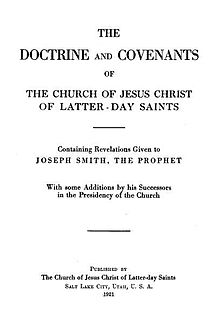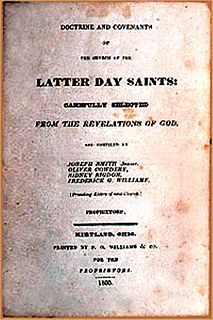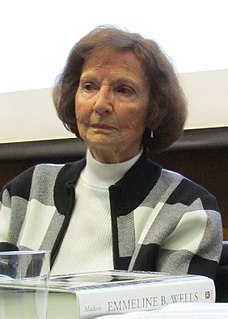
The standard works of The Church of Jesus Christ of Latter-day Saints are the four books that currently constitute its open scriptural canon. The four books of the standard works are:

The Doctrine and Covenants is a part of the open scriptural canon of several denominations of the Latter Day Saint movement. Originally published in 1835 as Doctrine and Covenants of the Church of the Latter Day Saints: Carefully Selected from the Revelations of God, editions of the book continue to be printed mainly by The Church of Jesus Christ of Latter-day Saints and the Community of Christ.

The "Word of Wisdom" is the common name of an 1833 section of the Doctrine and Covenants, a book considered by many churches within the Latter Day Saint movement to be a sacred text. The section defines beliefs regarding certain drugs, nutritious ingredients in general, and the counsel to eat meat sparingly; it also offers promises to those who follow the guidance of the Word of Wisdom.

The Joseph Smith Translation (JST), also called the Inspired Version of the Holy Scriptures (IV), is a revision of the Bible by Joseph Smith, the founder of the Latter Day Saint movement, who said that the JST/IV was intended to restore what he described as "many important points touching the salvation of men, [that] had been taken from the Bible, or lost before it was compiled". Smith died before he deemed it complete, though most of his work on it was performed about a decade beforehand. The work is the King James Version of the Bible (KJV) with some significant additions and revisions. It is considered a sacred text and is part of the canon of Community of Christ (CoC), formerly the Reorganized Church of Jesus Christ of Latter Day Saints, and other Latter Day Saint churches. Selections from the Joseph Smith Translation are also included in the footnotes and the appendix of the LDS-published King James Version of the Bible, but The Church of Jesus Christ of Latter-day Saints has only officially canonized certain excerpts that appear in its Pearl of Great Price. These excerpts are the Book of Moses and Smith's revision of part of the Gospel of Matthew.

The Book of Commandments is the earliest published book to contain the revelations of Joseph Smith Jr. Text published in the Book of Commandments is now considered scripture by The Church of Jesus Christ of Latter-day Saints as part of the larger Doctrine and Covenants.

The Latter Day Saint movement is the collection of independent church groups that trace their origins to a Christian Restorationist movement founded by Joseph Smith in the late 1820s.

The Church of Christ was the original name of the Latter Day Saint church founded by Joseph Smith. Organized informally in 1829 in New York and then formally on April 6, 1830, it was the first organization to implement the principles found in Smith's newly published Book of Mormon, and thus its establishment represents the formal beginning of the Latter Day Saint movement. Later names for this organization included the Church of the Latter Day Saints, the Church of Jesus Christ, the Church of God, the Church of Christ of Latter Day Saints, and the Church of Jesus Christ of Latter Day Saints.

William Earl McLellin was an early leader in the Latter Day Saint movement. One of the original members of the Quorum of the Twelve Apostles, McLellin later broke with church founder Joseph Smith.
Joseph Fielding McConkie was a professor of Ancient Scripture at Brigham Young University (BYU) and an author or co-author of over 25 books.
Jesse Gause was an early leader in The Church of Jesus Christ of Latter-day Saints and served in the First Presidency as a counselor to church president Joseph Smith. For decades Gause was generally unknown to LDS historians, and so could be considered the Church’s lost counselor of the First Presidency. It was only in the 1980s that research identified his rightful place among early Church leaders.
Prophet, seer, and revelator is an ecclesiastical title used in the Latter Day Saint movement. The Church of Jesus Christ of Latter-day Saints is the largest denomination of the movement, and it currently applies the terms to the members of the First Presidency and the Quorum of the Twelve Apostles. In the past, it has also been applied to the Presiding Patriarch of the church and the Assistant President of the Church. Other denominations of the movement also use these terms.
"We Thank Thee, O God, for a Prophet" is a hymn of The Church of Jesus Christ of Latter-day Saints. It has been sung at many general conferences of the LDS Church since it was published in 1863.
Dean Cornell Jessee is a historian of the early Latter Day Saint movement and leading expert on the writings of Joseph Smith Jr.
Arnold Kent Garr was the chair of the department of Church History and Doctrine at Brigham Young University (BYU) from 2006 to 2009. He was also the lead editor of the Encyclopedia of Latter-day Saint History.

Carol Cornwall Madsen is an emeritus professor of history at Brigham Young University (BYU) where she was a research historian with the Joseph Fielding Smith Institute for Church History. She also served as associate director of BYU's Women's Research Institute. She has written 50 scholarly articles and several books.
Steven Craig Harper is a professor of church history and doctrine at Brigham Young University. He was a historian for the Church History Department of The Church of Jesus Christ of Latter-day Saints. From 2019, he is the Editor-in-Chief of BYU Studies Quarterly.

Selected Manifestations: Being an Unofficial Collection of Temple Dedicatory Prayers, Revelations, Visions, Dreams, Doctrinal Expositions, & Other Inspired Declarations Not Presently Included in the Official Canon of Scriptures Known as the Four Standard Works of the Church of Jesus Christ of Latter-day Saints is a 413-page book self-published in 1985 by David M. and Vonda S. Reay. It is a compilation of scarce, non-canonical revelations of leaders of The Church of Jesus Christ of Latter-day Saints.

The President of the Church is the highest office of The Church of Jesus Christ of Latter-day Saints. It was the office held by Joseph Smith, the church's founder. The church's president is its leader and the head of the First Presidency, its highest governing body. Latter-day Saints consider the president of the church to be a "prophet, seer, and revelator" and refer to him as "the Prophet", a title that was originally given to Smith. When the name of the president is used by adherents, it is usually prefaced by the title "President". Russell M. Nelson has been the president since January 14, 2018.
This page is based on this
Wikipedia article Text is available under the
CC BY-SA 4.0 license; additional terms may apply.
Images, videos and audio are available under their respective licenses.










